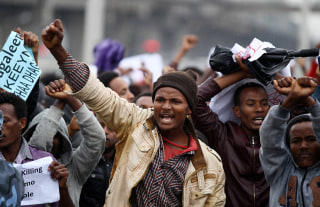An Ethiopian opposition party leader warned Monday "the situation will get worse" after a weekend of violence in the African nation that left nearly 100 anti-government demonstrators dead.
"People are desperate and the government is not respecting the demands of the protesters," Mulatu Gemechu of the opposition Oromo Federalist Congress Party told NBC News in a telephone interview.

Most of the bloodshed was in the Oromia region, the most populated part of the country, and in the Amhara region.
"In Oromia, you see so much tension," said Gemechu. "Military troops everywhere and for any little thing, opposition and student protesters are imprisoned, beaten or killed."
While the protesters have been demanding for months an end to human rights abuses by the country's government in Addis Ababa and the release of political prisoners, the new demonstrations have also been fueled by widespread discontent with the eroding quality of life in the country.
"Inflation is going up, electricity, water, infrastructure systems are all collapsing," said Gemechu. "Daily life here has become so difficult and the people refuse to be silent any longer."

Mohammed Ademo, founder of Opride.com, said what's happening in Ethiopia could potentially bring down the government, which is why it is cracking down so hard.
"I have not seen anything of the sort happening now in my entire life," Ademo said. "The closest historical parallel is the revolution that saw the demise of Ethiopia's last emperor, Haile Selassie. Even in that case the protests were largely confined to urban centers. The current protests have swept an entire region - nearly half of the country — galvanizing two of the country's largest ethnic groups — the Oromo and Amhara."
There was no immediate comment from the Ethiopian government but the state-owned Ethiopian News Agency said "illegal protests" by "anti-peace forces" had been brought under control. It made no mention of casualties.
Amnesty International, however, said at least 97 protesters were killed by government forces firing live bullets. At least a third of the casualties were in the northern city of Bahir Dar.
The security forces' response was heavy-handed, but unsurprising" said Michelle Kagari, Amesty's Deputy Regional Director for East Africa. "Ethiopian forces have systematically used excessive force in their mistaken attempts to silence dissenting voices."
Ethiopia is a key U.S. ally in the war against Islamic militants in neighboring Somalia. And after the bloodshed, the State Department said it was "deeply concerned."
"We reaffirm our call to respect the constitutionally enshrined rights of all citizens, including those with opposition views, to gather peacefully and to express their opinions," the U.S. embassy in Addis Ababa said in a statement.
No comments:
Post a Comment